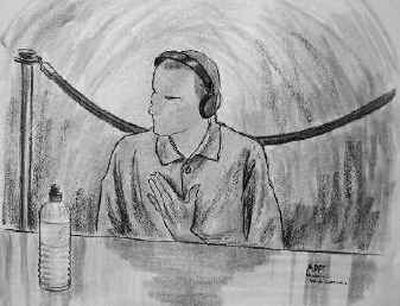Detainee says he was member of al Qaeda

GUANTANAMO BAY, Cuba – A Yemeni prisoner confessed Thursday to being a member of al Qaeda during a prelim-inary hearing before a military commission, but was cut off in midsentence by the presiding official and was not allowed to complete his statement.
In a show-stopping moment in the third day of military hearings for accused terrorists, Ali Hamza Ahamad Sulayman al Bahlul said in Arabic: “People of the entire globe, know that I testify that the American government put me under no pressure. I am from al Qaeda and the relationship between me and Sept 11th …”
Bahlul was halted by Ret. Army Col. Peter Brownback III, who told his four fellow commission members serving as judges to disregard the statement. Brownback said the trial had not reached the stage where the detainee could offer a plea and said it was unclear whether Bahlul would be represented by an attorney and therefore should not issue a plea. It was not clear what purpose Bahlul had in making the surprise announcement.
At a briefing in Washington, D.C., Air Force Brig. Gen. Thomas Hemingway, the chief Pentagon legal adviser on the commissions, said that if it is later determined that Bahlul’s statement prejudiced the panel, Brownback could convene another commission. The detainee faces a possible life sentence for conspiracy to commit war crimes.
He is the third detainee to face preliminary hearing before the military commission, which began considering charges against some of the 585 detainees at Guantanamo this week.
Bahlul, a 36-year-old Yemeni, has said he does not want an attorney appointed by the U.S. military and would prefer to represent himself. Brownback first said rules would not allow detainees to represent themselves, but later said he would pass the question on to retired Army Maj. Gen. John Altenburg, head of the Pentagon Office of Military Commissions.
However, the hearing also was beset by confusion over translation problems, which left it unclear what Bahlul was trying to say.
The official commission translation had Bahlul prefacing his confession by saying: “The decision is the evidence. … I testify that the American government is under no pressure.”
Outside the courtroom, a translator for another defendant and an Arab journalist both asserted Bahlul actually said, “Confession is the highest form of evidence. … People of the entire globe know that I testify that the American government put me under no pressure.”
At a separate proceeding across the base to determine whether a Moroccan was lawfully being held as an enemy combatant, the accused man argued with a government translator over whether he said he went on a pilgrimage to Afghanistan or said he had moved there.
The translation difficulties and confusion over hearing rules angered some observers.
“What we saw this morning was really a clash of issues of translation and a lack of identifiable procedure,” said Jumana Musa of Amnesty International. “When a trial proceeds as it did this morning, it really calls into question the entire process.”
For the second day, defense lawyers stopped the hearing because of complaints over translation errors. A translator was dismissed for the day on Tuesday after a defense lawyer complained that his client “can’t understand a thing the translator is saying.” In one case, a translator used the phrase “United States or its allies” when the questioner referred to Afghanistan’s Northern Alliance.
Arabic includes a broad variety of dialects that are in some cases so distinct that Arab speakers cannot understand one another.
Bahlul’s Pentagon-appointed defense lawyers, Navy Cmdr. Philip Sundel and Army Maj. Mark Bridges, said that after months of unsuccessfully trying to get their Yemeni translator approved, they accepted an alternate who had military approval. However, they ended up firing that person for incompetence.
Critics said that the translation issues also suggest that confessions and witness statements made to military investigators and used as evidence against the detainees may be unreliable – an issue that defense lawyers also are expected to raise.
“We have to wonder who are the other translators who are doing the interrogations,” said observer Sam Zia-Zarifi of Human Rights Watch.
The legal problems and translation difficulties perplexed observers and underscored the difficulties of crafting a new justice system from scratch. The military commission process was authorized by President Bush in 2001 to try prisoners from the war in Afghanistan. It is based loosely on a brand of military justice last used in World War II. With little legal precedent and a structure that requires only that the presiding officer be a lawyer, the panel of five members and one alternate was left exploring new ground.